On May 8, Dr. Anne d’Aquino was notified by the university about the dismissal of her contract as a result of an optional class assignment relating to the humanitarian crisis in Gaza.

Dr. Anne d’Aquino speaks at a press conference organized on June 6, 2024, by members of United DePaul at Belden Avenue next to McGowan South and the Quad. The press conference was followed by members delivering a 14-foot-long petition to the Provost. Photo by Alexandra Murphy
When Dr. Anne d’Aquino was with her family celebrating her sister giving birth, she was not expecting a phone call from the chair of Health Sciences at DePaul University. Especially not one that questioned an assignment she posted on Desire2Learn (D2L), the university’s learning management system.
D’Aquino received her PhD in biological science from Northwestern University in 2020 and was hired to teach HLTH 194 (Human Pathogens and Defense) in the Spring quarter of the academic year 2023-2024. D’Aquino was out of town during the first week of May when her employment as an adjunct faculty member was terminated.
Within a month of her employment, she was questioned about an assignment she posted, received her termination letter and was subject to an appeal hearing that sustained her termination. She says this development was surprising.
“I was very surprised, I was disappointed. And I was confused. I didn’t feel like the termination email really gave me a good reason of why I was fired,” d’Aquino recalls.
Dr. Sarah Connolly, professor and chair of Health Sciences, called d’Aquino on May 7, 2024, a day after the assignment was posted. Her first question was why the instructor had used the words “genocide” and “ethnic cleansing” in the classroom. D’Aquino cited that a human rights expert had testified to the United Nations Human Rights Council that she found “reasonable grounds” to believe the humanitarian crisis in Gaza is a genocide. According to d’Aquino, Connolly told her that “for what it’s worth” her content for the course overall was really good on D2L.
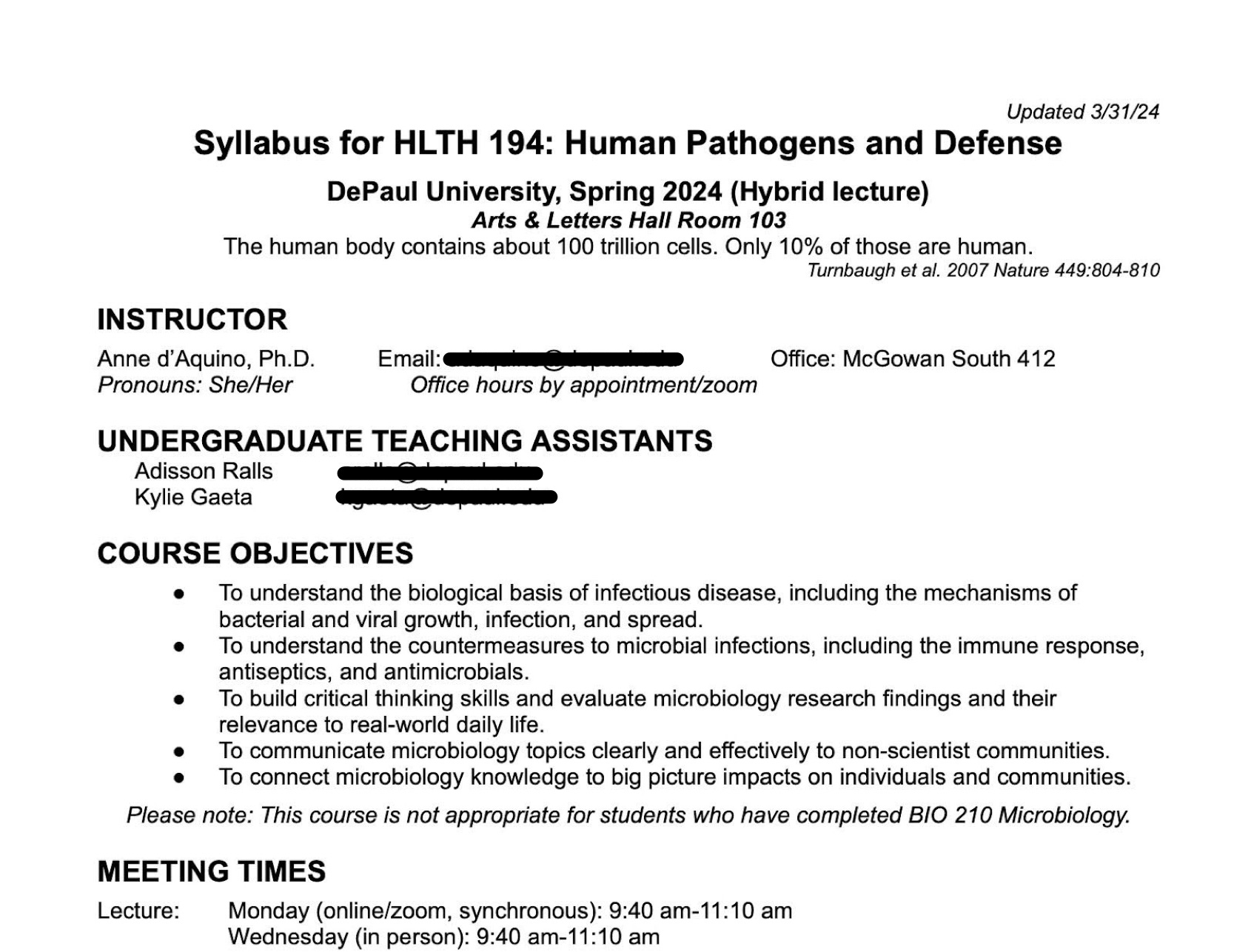
This is d’Aquino’s syllabus that displays the course objectives for her class.
In the hybrid course description, some of the main objectives of the course included “to understand the biological basis of infectious disease, including the mechanisms of bacterial and viral growth, infection and spread,” and another was “to build critical thinking skills and evaluate microbiology research findings and their relevance to real-world daily life.”
In week six of the course, d’Aquino shared an assignment with the class, resulting in her termination. This was an extended optional assignment that offered students to use scientific analysis and critical thinking to understand and communicate the “impacts of genocide on human biology” and “the creation of a decolonized future.” D’Aquino also sent out an email to students explaining she was expanding the scope of assignment 6 and students could choose either option for submission.
In a press conference held Thursday afternoon by United DePaul, d’Aquino spoke out about her disappointment in the decision by the university to terminate her contract. She said the reasoning given by the Health Sciences Department for her being let go was because the assignment material did not relate to the course objectives. However, she argued DePaul hired her to teach about Human Pathogens and Defense, and the assignment focused on the war in Gaza as a health crisis.
“The assignment was in fact related to the course and its objectives,” she said. “For months, scientists and physicians have been warning about the spread of infectious disease in Gaza due to starvation, malnutrition, overcrowding, destruction of critical water and sanitation.”
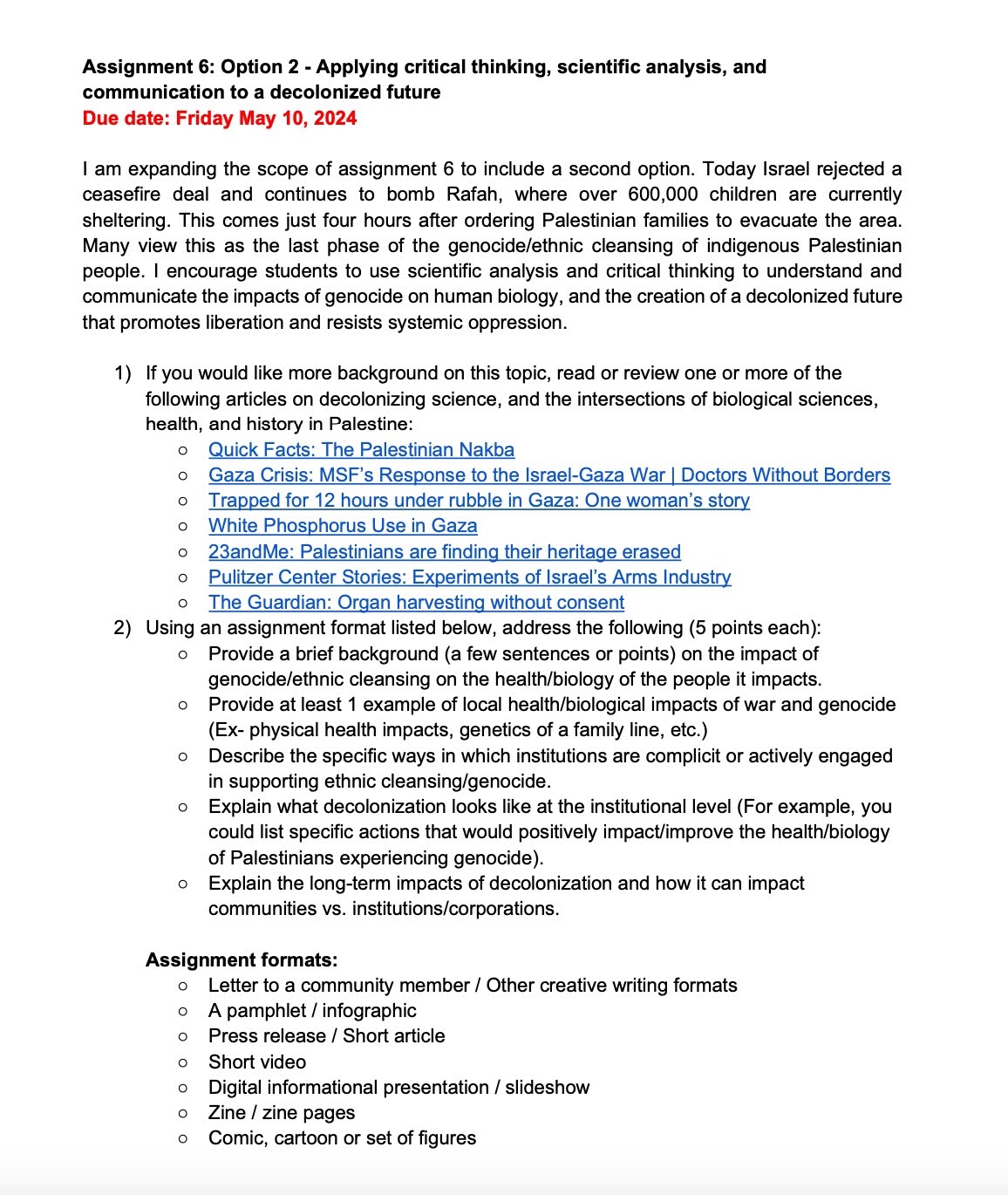
Anne d’Aquino shares the optional assignment’s parameters over email and D2L on May 6, 2024.
The university administration did not see the relevance of the assignment in the same way. In a statement by Kristin Mathews, the senior director of strategic communications, the university expresses that the email and assignment “included explicit statements promoting a political agenda unrelated to the course topic of microbiology.”
Mathews also noted that the assignment came at an inappropriate time when tensions at the university were high due to the encampment on the Lincoln Park campus quad.
“We understand that the faculty member claims the assignment was related to a course objective that included, ‘connecting microbiology knowledge to big picture impacts on individuals and communities.’ However, this course objective was not part of the original syllabus that was approved for the course,” she said.
When the assignment was posted, the class had reached a stage where d’Aquino could pick out more contemporary examples, which is why she said that she picked up the case study of the humanitarian crisis in Palestine. “I wouldn’t say that I purposely incorporated politics, but we don’t exist in a bubble. So, I made it as biology-centered as you can,” she said.
The university reasoned that they terminated d’Aquino’s employment because students had raised concerns about the material introducing political matters outside of this particular assignment.
“We investigated the matter, spoke with the faculty member, and concluded it had negatively affected the learning environment. As a result, the part-time faculty member was released from her appointment at DePaul University,” Mathews said.
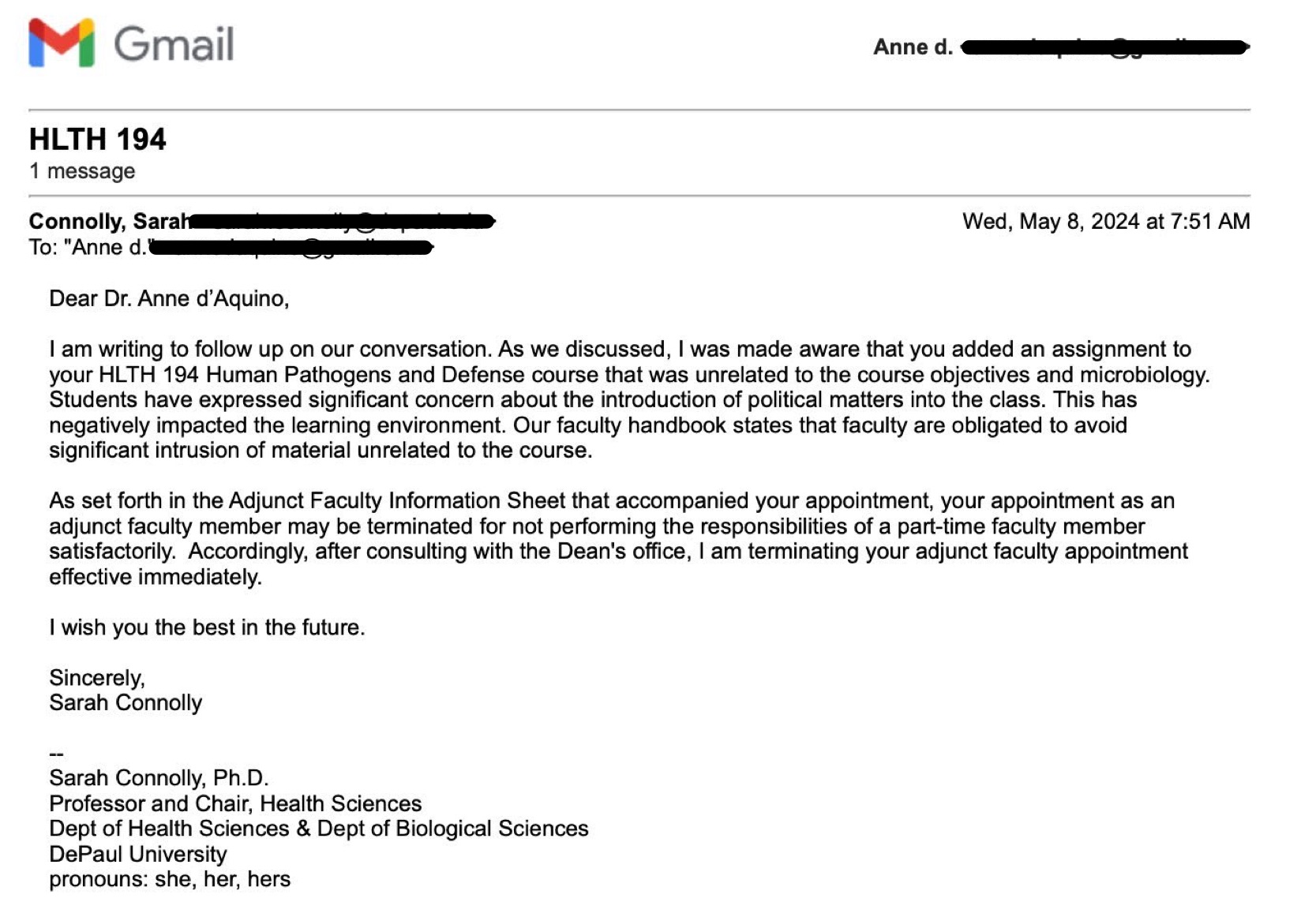
A follow up email sent from Connolly on May 8, given to 14 East with permission by d’Aquino.
Students from d’Aquino’s classroom shared their insights about what it was like to attend her lectures and do the assignments.
Peyton Normann and Xavier Sandoval both said they received notice of d’Aquino’s termination in an email sent by Connolly at 9:25 p.m. on May 7, stating that there would be no class the next day. “They didn’t really do anything to confirm or deny it,” she expressed.
A day later on May 8, Normann said the class received a second email saying there would be a change in instructors.
When reflecting back on the course, Normann explained she didn’t understand why d’Aquino was dismissed when she had made it clear in the assignment that the second part was optional. Even after expressing her own beliefs, she said d’Aquino made it clear students in the class were entitled to their own opinions on the matter.
“She made it clear that you are allowed to have your own opinion, I just want to let you guys know that if you support this, this is a safe place to do so,” Normann said. “I think it leaves a very bad taste in my mouth and I’m not feeling very proud.”
Normann was even more surprised when the professor who took over to teach the rest of the class was Sarah Connolly, the professor who notified d’Aquino about her termination. She explained going to the next class period and seeing Connolly there was a strange feeling given the recent events.
Sandoval, another student in the course, also shared a similar sentiment. He was confused by d’Aquino’s termination when the assignment material gave students a choice. He also said he and his friends have since talked about how nice it was to have a professor supporting her students during a difficult time.
“It was nice to know that our professor had stood alongside us,” said Sandoval. “It was like, wow, you don’t see professors going out of their time to create assignments, on world events and also relating it back to the course.”
On May 14, d’Aquino filed a “notice of intent to appeal dismissal” to Provost Salma Ghanem and Dr. Sonia Soltero, Chair of the Department of Leadership, Language and Curriculum on the basis that the decision violated her academic freedom. The appeal letter given to 14 East by d’Aquino includes a section about her appointment to DePaul, details of the course objectives, a timeline of the optional assignment that led to her termination and a section that states DePaul violated academic freedom giving examples from the Faculty Handbook.
According to d’Aquino, the Faculty Handbook affords DePaul the academic freedom to “participate in the various forms of open inquiry and debate, as for example, classroom presentation and discussion, research and publication, public statements made as a citizen in one’s own name and other forms of creative expression.”
In a statement to 14 East, the university commented that they had not violated d’Aquino’s academic freedom because of the “extraneous political material” in the assignment which was, in its view, “outside the scope of the academic subject as outlined in the curriculum.”
While any faculty members, including adjunct professors, are allowed to appeal their termination, the process for adjuncts is expedited. Moreover, their employee agreement clearly states that “this appointment and any course assignment may be terminated by DePaul at any time without notice, penalty, or further obligation if, in DePaul’s sole discretion, there is basis for such cancellation.”
In response to the university’s actions, John Gould, a PhD student and founder of United DePaul, started a petition with demands like asking the university to “reinstate the adjunct who was fired with back pay” and “adopt and uphold a rigorous standard of academic freedom in line with peer institutions and associations of instructors such as the American Association of University Professors.”
D’Aquino reached out to Gould after this incident, taking up a mutual friend’s suggestion to do so. Gould and the rest of United DePaul have shown public support for the adjunct faculty even sharing this information publicly on the official Instagram account. D’Aquino says she felt incredibly supported by faculty members organizing for her even though she had joined the university only a month ago.
“I just feel like arms are wrapped around me when nobody had even seen my face. Nobody knew who I was,” she said.
Along with the press conference, members of the demonstration delivered the 14-foot-long petition with the signatures to Provost Salma Ghanem’s office. While Ghanem was not physically present to accept the petition, an employee in her office did so on her behalf.
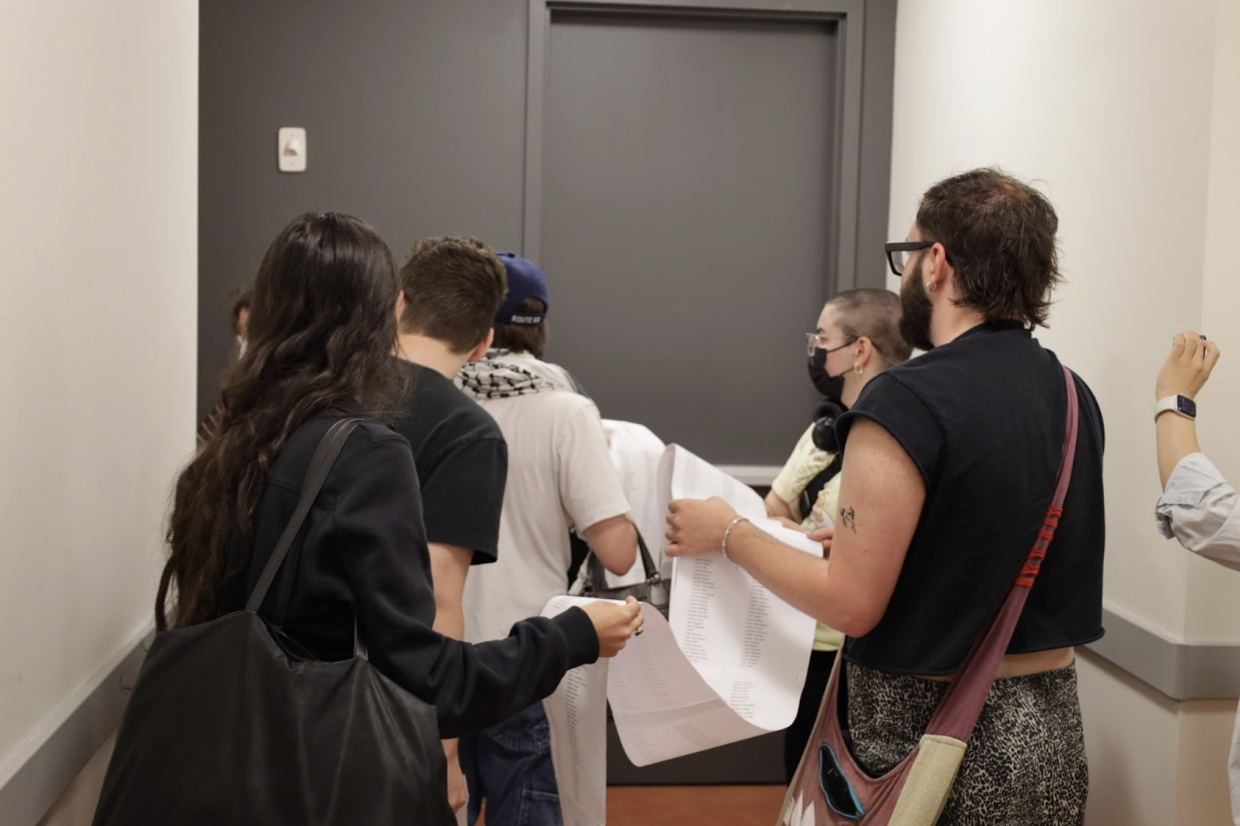
Members from the press conference brought the 14-foot-long petition with signatures to Provost Salma Gahanem’s office on June 6, 2024. The petition asked the university for four demands, the foremost being the reinstatement of d’Aquino’s employment. Photo by Alexandra Murphy
At the press conference on Belden Avenue, several people spoke out for d’Aquino’s dismissal including a faculty member, the co-founder of Jews for Justice and d’Aquino herself. After that, a small group holding the petition went to the floor of the College of Sciences and Health building to hand over the scroll before returning to Belden Avenue, where protesters continued chanting in support of d’Aquino’s reinstatement.
Members of the protest and United DePaul are determined to keep the momentum of this demonstration going. They have given the university administration one week to respond and act on the demands set. Gould says that further action will be taken if the demands are not met.
Alyssa N. Salcedo produced the audio piece for this story.
Header photo by Alexandra Murphy, edited by Sam Freeman


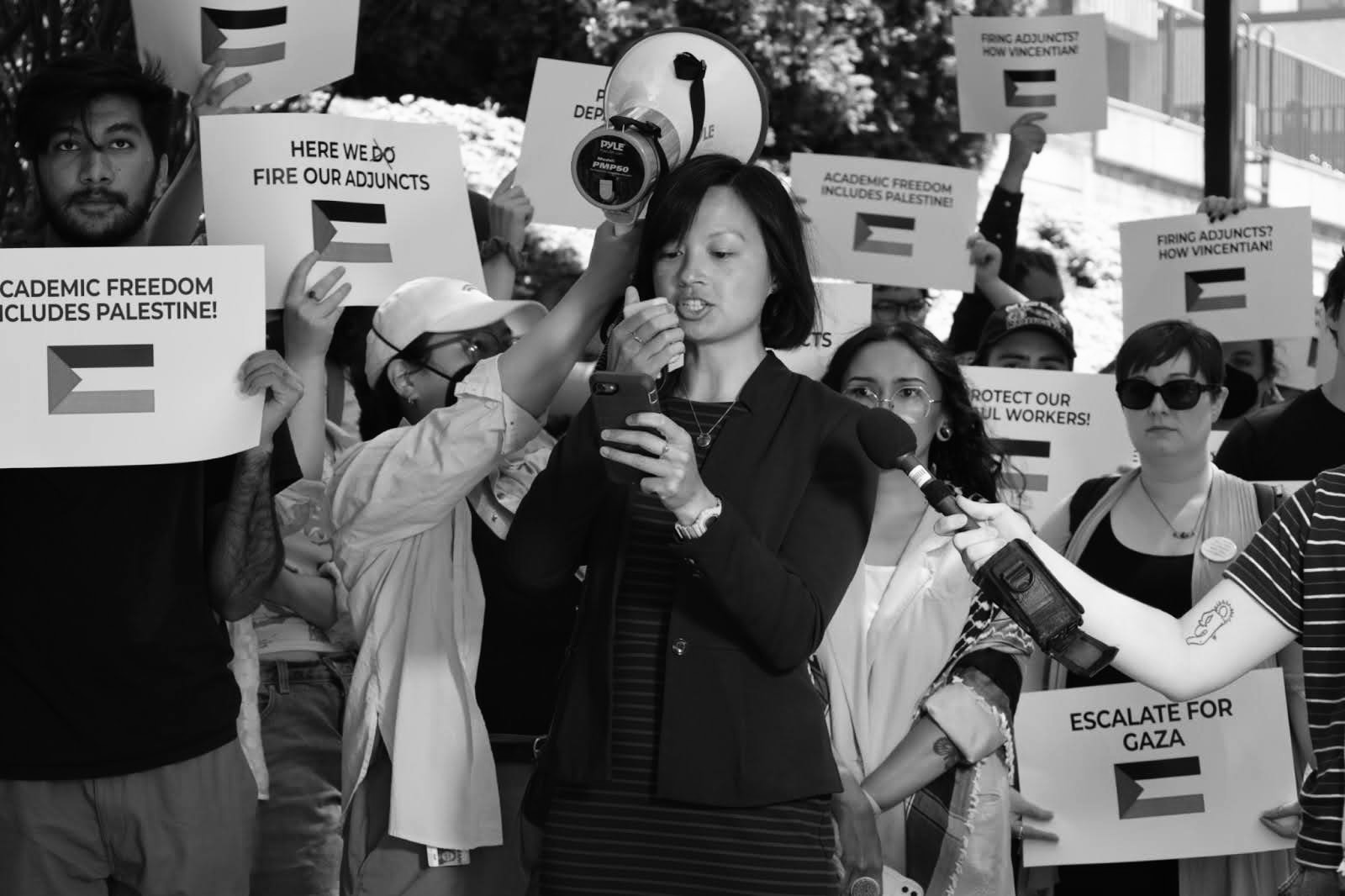

NO COMMENT